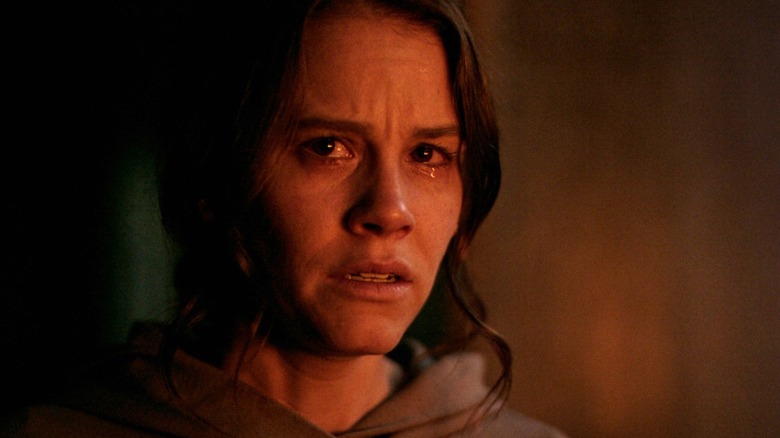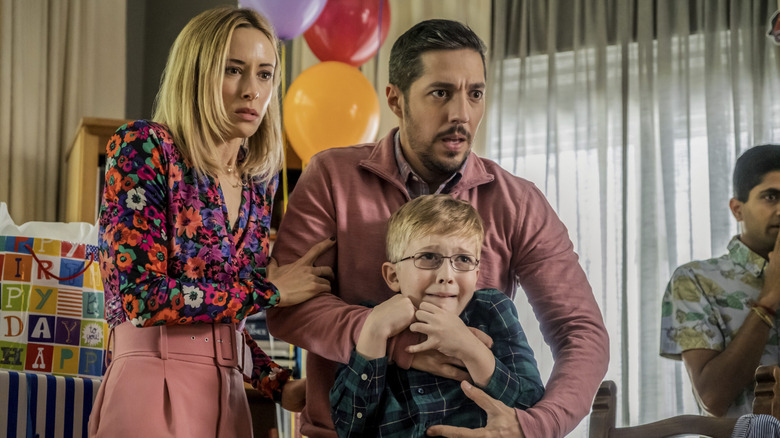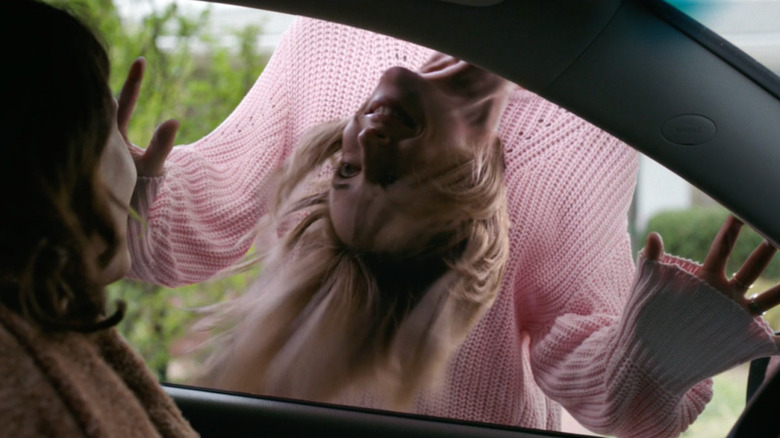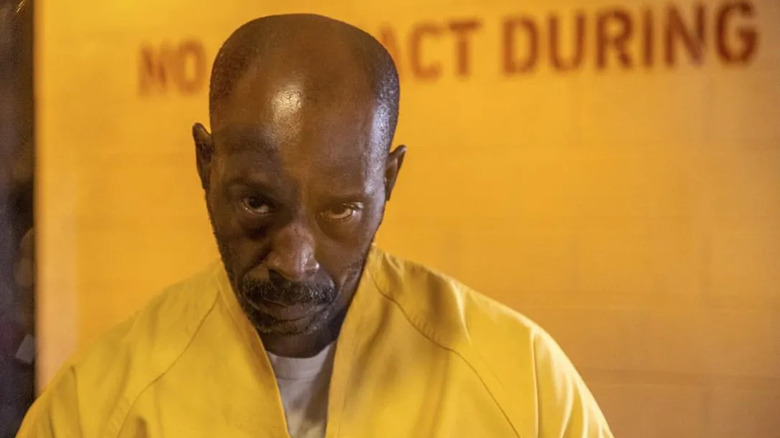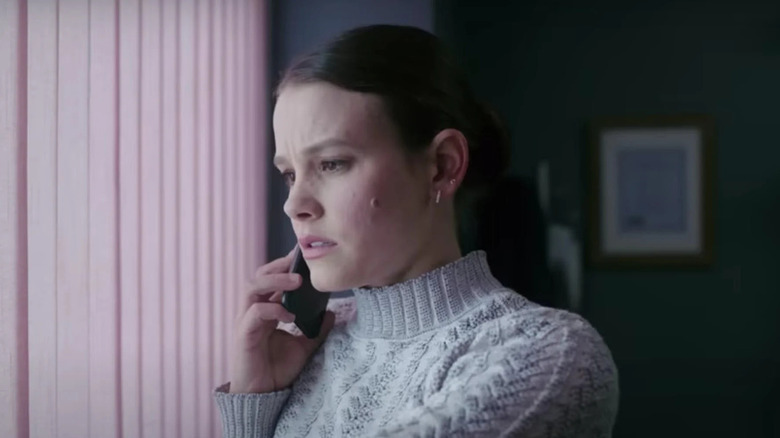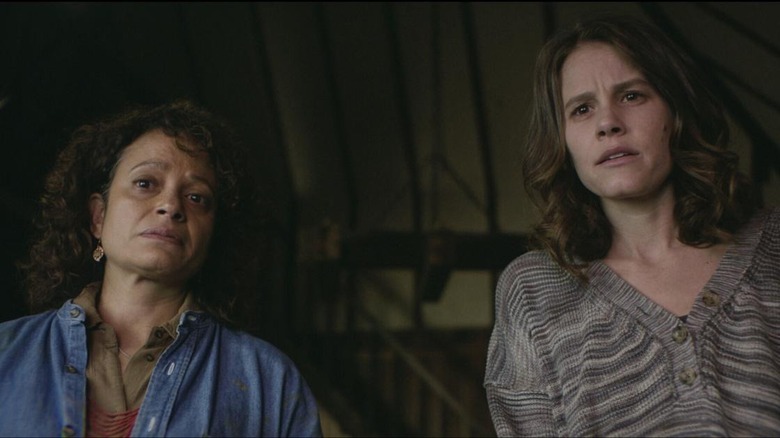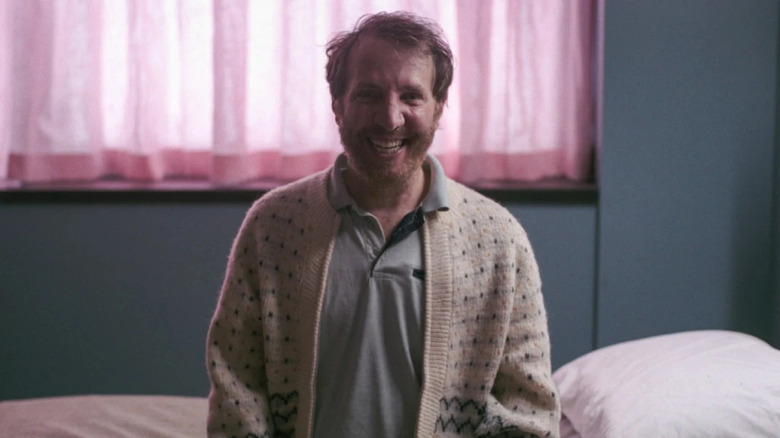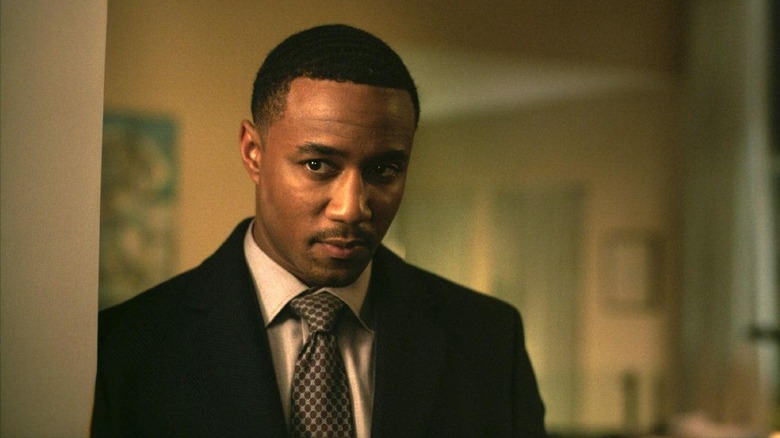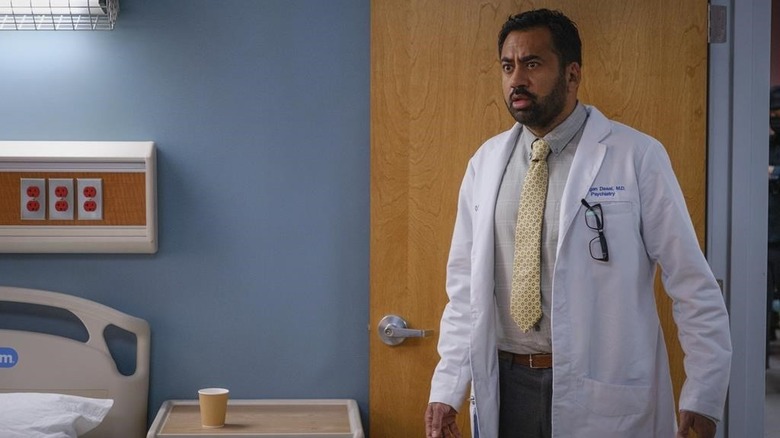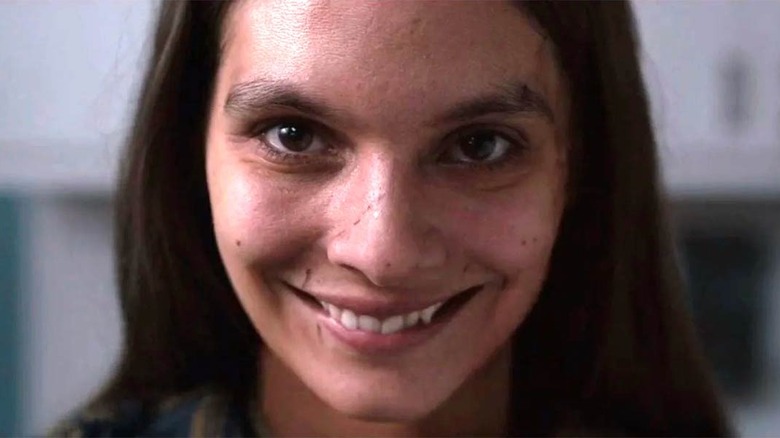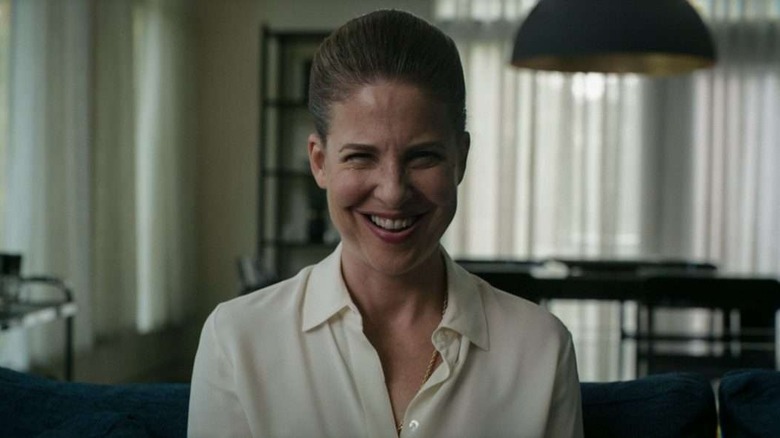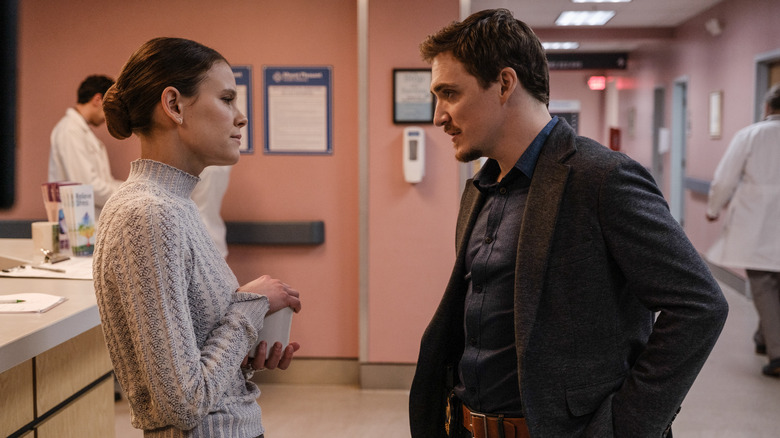Every Main Character In Smile, Ranked Worst To Best
Major spoilers for "Smile" follow.
Horror movies often explore the fear and discomfort that arise from difficult subjects. Some, of course, do so more successfully than others. Unfortunately, writer-director Parker Finn's debut feature, "Smile," tries and fails to explore mental health issues with any nuance or sensitivity. The film concerns a string of mysterious suicides that might actually be caused by an evil entity that stalks its victims with a large smile on its face. However, because of an overreliance on jump scares and a lack of respect for people with mental illnesses, you may not be sporting the same expression when you leave the theater.
Most of the characters in "Smile" can be ranked based on how much empathy they show and how much ableism they exhibit. That said, the film doesn't show much empathy itself, and even goes so far as to use ableist language for comic relief. As a result, there are few characters who can reasonably be labeled "good." Instead, consider them "less bad." Though the supporting cast is strong, the film's writing and direction fall short, and its depiction of mental illness leaves a lot to be desired, especially for a film released in 2022.
This article involves numerous mentions of suicide. If you or anyone you know is having suicidal thoughts, please call the National Suicide Prevention Lifeline by dialing 988 or by calling 1-800-273-TALK (8255).
11. Greg
Greg (Nick Arapoglou) is the brother-in-law of Rose (Sosie Bacon), an ER doctor who treats patients with psychological issues. Greg is married to Rose's sister Holly (Gillian Zinser), who doesn't seem to like Greg very much. Who can blame her? Greg is materialistic and obnoxious.
For example, when Rose and her fiancé, Trevor (Jessie T. Usher), go on a double date with Greg and Holly, Greg asks Rose why she wastes her time helping "crazy" people, telling her that she should work shorter hours and make more money. The whole point of being a doctor, according to Greg, is to get rich and buy a nice house.
In addition to the classism and callous ableism behind Greg's argument, it's a particularly odd point considering how lavish Rose and Trevor's house is. It's a huge, expensive home out in the country; Rose and Trevor clearly aren't struggling to make ends meet. Even if Rose weren't wealthy, though, Greg's advice would be a distasteful indicator of how boorish and shallow he is.
10. Holly
Holly is almost as bad as her husband. She's self-obsessed and small-minded. When she has to remind Rose about a birthday party for Holly and Greg's son Jackson (Matthew Lamb), for example, Holly acts as if Rose has dumped a bucket of ice water on her. She becomes even more insulted when Rose says she has to work that day. It's a Saturday, after all. Saturdays aren't for helping people; they're for giving pricey gifts to seven-year-old boys.
Rose does make it to the party, and Holly spends a few minutes saying awful things about her husband (which, again, might be warranted), then shuffles her sister over to her friend Stephanie (Sara Kapner), who helps Rose find a drink. If Stephanie played a larger role in the film, she'd rank pretty high on this list simply for helping Rose try to survive the party. (Kapner is also the cast member with the creepiest smile, so she deserves special mention for that alone.)
Though "Smile" doesn't give the viewer enough information to understand Holly in any depth, we do get some insight into why she chose a life of comfort and surface-level concerns. Due to murky suggestions of depression and addiction, Rose and Holly's mother (Dora Kiss) was neglectful and possibly abusive, and Holly left home as soon as she could to escape. Though Rose resents Holly for abandoning her, it's hard for the audience to judge her for leaving such an unhealthy living situation. So, no matter how unpleasant Holly is, she ranks above Greg; we may or may not agree with her choices, but we can sympathize with her desire to leave a traumatic past behind her.
If you or anyone you know needs help with addiction issues, help is available. Visit the Substance Abuse and Mental Health Services Administration website or contact SAMHSA's National Helpline at 1-800-662-HELP (4357).
9. Robert Talley
Thanks to investigative work conducted by her ex-boyfriend Joel (Kyle Gallner), Rose discovers that only one person has survived the smiling entity: Robert Talley (Rob Morgan), who's been incarcerated on murder charges. Robert escaped death at the hands of the supernatural threat by passing the "curse" on to someone else, i.e., by murdering someone and making sure there's a witness (it's never explained how Robert figured this out). That witness becomes the next person to die. In one of those lines of dialogue that explicitly spell out the film's themes, Robert tells Rose, "That's what gives it power: trauma."
"Smile" raises thorny questions about the cycle of mental illness, abuse, and trauma that, unfortunately, it can't answer. In fact, it doesn't seem interested in really trying, choosing instead to use those issues as window dressing for poorly telegraphed jump scares. Still, for the characters in the film, trauma is inescapable. Only two fates await each of them: jail or death. Robert chooses the former. Though he is, technically, a murderer, the film's moral calculus proves that he had no choice. He acted in self-defense, and as such, he earns a higher spot on this list than one might expect.
8. Rose
At the end of "Smile," we learn that Rose didn't become a doctor because of a desire to help people. She became a doctor out of guilt over letting her mother die. Rose's mom tries to die by suicide, but Rose finds her still alive and begging for help. Instead of calling for an ambulance, however, Rose closes the door and lets her mother expire. "Smile" never tells the viewer much about Rose or Holly's childhoods, but the sisters' descriptions of events suggest that their mother was abusive. Near the end of the film, Rose tells her mother's specter she let her die because she was "a monster" who terrified Rose.
It's impossible to say what Rose's mother was really like, as the film seems to be conflating different types of mental illness and trauma (this is why Rose's mother didn't make this list herself — the film prevents us from having an informed opinion on her). What the viewer does know, though, is how her illness affected Rose, and that it left her consumed by guilt and only superficially interested in her patients. Based on her behavior, Rose wants people who she believes to be mentally ill — including herself — to be placated and medicated, not made healthy. Rose might not be a bad person, but she's clearly a bad doctor.
7. Victoria Muñoz
"Smile" begins when Laura Weaver (Caitlin Stasey), a new patient, meets with Rose. Laura thinks that a sinister presence is following her. Specifically, ever since she witnessed the apparent suicide of her professor, she's been stalked by something that sometimes appears as a stranger, and sometimes pretends to be someone she knows (that's just one of many ways in which "Smile" mimics David Robert Mitchell's far superior "It Follows").
Searching for answers, Rose visits the professor's widow, Victoria Muñoz (Judy Reyes). At first, because Rose lies to her and claims to be a reporter, Victoria is helpful. She shows Rose her husband's drawings of the grinning figure he said was stalking him. However, when Rose's questions become more suspicious, Victoria throws her out.
Victoria only appears in one scene, so we don't learn much about her, but she seems like a kind woman who's grieving a tremendous loss as best she can. Her anger and distrust of Rose are totally justified, and she has the audience's complete sympathy when she orders Rose to leave her home.
6. Carl Renken
Carl (Jack Sochet) frequently visits the ER. We see him at the beginning of the film muttering to himself in distress as Rose attempts to calm him down. In one of a few scenes that make the viewer doubt Rose's skills as a therapist, she tells him that what he's experiencing isn't real, and that he's having a manic episode. Later, Rose sees Carl grinning menacingly at her. When he stands up and yells, she has security restrain him, only to find that Carl is lying calmly in bed and that the malevolent entity has tricked her into thinking Carl was a threat.
After Rose visits Robert Talley, she goes back to the hospital with the intention of murdering Carl to pass the curse on to someone else. Evidently, Rose sees Carl as the most disposable person in her life, exposing a shockingly callous attitude for a doctor to have towards a patient. Though we know very little about Carl, we do know that he's harmless, and that his struggles frequently necessitate hospital visits. That earns him a high spot on this list. It should also garner him a great deal of sympathy from the other characters, especially his own doctor, but Rose is much less altruistic than she wants people to think she is.
5. Trevor
Trevor, Rose's fiancé, is warm and supportive, defending her against Holly and Greg when they criticize her job choice and consoling her when she comes home distraught after Laura's apparent suicide. The script betrays Trevor, though, giving him a worrisome heel turn when he confronts Rose about her troubling change in behavior. He says that he looked up mental illness online and found that it's genetic, accusing her of inheriting her "crazy" from her mother.
While Trevor shows a bit more empathy than Holly does, enlisting Rose's therapist to try to get her help before she hurts herself or someone else, he still demonizes Rose and shows a bizarre ignorance of mental health issues. That ignorance, however, permeates the entire film; accordingly, Trevor has to be graded on a curve. From that perspective, his love for Rose and desire to get her help earn him a charitable spot on this list.
4. Dr. Morgan Desai
Dr. Desai (Kal Penn) is Rose's boss. Though he's forced to play bureaucrat — at the behest of the hospital board, he calls Rose into his office to scold her for admitting patients who have no insurance — he cares about his employees and their patients. When Rose begins acting erratically, including showing up at the hospital with a knife when she's supposed to be on mental health leave, Dr. Desai is worried and tries to get her help.
Much like the other characters in the film, there's not much depth to Dr. Desai, but what we do see is a man who truly cares about helping people, even when it means going above and beyond or fighting the people who sign his checks. Dr. Desai is often stuck between a rock and a hard place, but he seems to be a good physician and a good person.
3. Laura Weaver
Laura (Caitlin Stasey) is the patient who apparently dies by suicide right in front of Rose, passing the "curse" on to her. Just as she does with Carl, Rose tells Laura that what she's experiencing isn't real and can't hurt her. Obviously, though, Rose is wrong, and Laura dies soon afterwards.
Though, once again, we don't learn much about Laura, we do know that she looked for help despite the horrible entity haunting her. Laura reached out to people who were supposed to listen to her, but instead found a doctor who thought she was irrational and callously dismissed her claims. Laura's death sets off the events of the film, but it's through no fault of her own; she tried to warn Rose, and Rose refused to listen. When Rose finds herself in the same situation later on, it's a cruel but appropriate irony that (almost) no one believes her.
2. Dr. Madeline Northcott
Dr. Northcott (Robin Weigert) is Rose's therapist, although Rose stopped seeing her at some point despite Dr. Northcott's belief that they should continue their sessions. Unlike Rose, she seems to know what she's doing. Northcott refuses to give Rose a prescription when she rationalizes away the things she's been seeing, and while it was a mistake on Northcott's part to go along with Trevor's plan and confront Rose about her troubling behavior, she obviously cares a lot about her patient.
No one in the medical profession comes out looking good in "Smile." Whether that's intentional or not is hard to say, given the film's questionable handling of mental health issues and its inability to distinguish itself from its influences in any meaningful way. Still, Dr. Northcott obviously wants to do right by Rose and her other charges, which is enough to earn her one of the top spots on this list.
1. Joel
Joel is one of the detectives assigned to Laura's case, and also Rose's ex-boyfriend. When he and his partner, Detective Buckley (Perry Strong), interview Rose about Laura's death, Joel takes a far more sensitive approach than his partner. There's a great deal of ableist language in "Smile," and Detective Buckley is one of the worst offenders, declaring that Laura's "f***ing crazy" for smiling when she apparently died by suicide. It's a line that seems designed to elicit laughs, given its timing and delivery. Joel, though, has the most open mind of anyone in the film, listening to Rose's explanation about the chain of supposed suicides and quickly coming to believe her.
Unfortunately for Joel, that sensitivity only puts him in danger, adding a cynical layer to the film: The people who write Rose off and cut ties with her save themselves, while the person who believes her gets dragged down as well. It's a hideous way to view people with mental illnesses — in "Smile," they're albatrosses around the necks of loved ones, and anchors that weigh down innocent bystanders — and it makes for a deeply mean-spirited movie. Though Kyle Gallner gives the strongest performance in "Smile," he can only do so much to save the film from itself. Joel is the best of the film's characters, but that's not saying much.
